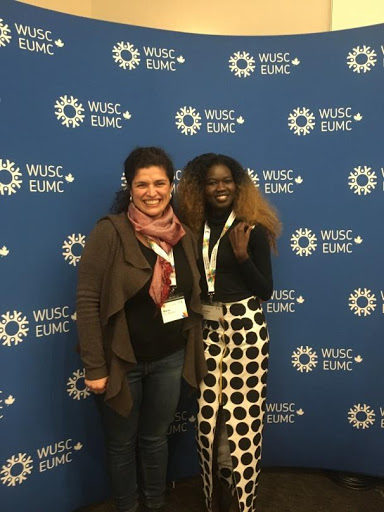This article, written by Philip Girvan, StFXAUT Communications Officer, appeared in the Summer 2019 edition of The Beacon.
The Winter 2018 issue of The Beacon profiled the World University Service of Canada (WUSC), the specific role of the StFX WUSC Society, and WUSC’s Student Refugee Program (SRP).
The SRP is a resettlement program that provides refugee students an opportunity to pursue post-secondary studies in Canada. To support the students attending StFX, the University waives tuition, residence, and meal hall fees. A four dollar levy included in student union dues cover books, travel, technology, and accommodation during the summer months. This money is enough to cover costs during the student’s first year of study.

Kristen Stephens, the current StFX WUSC Society President, explained the limitations of this funding model to The Beacon:
What we can do right now, with our student levy, is fully support a student during their first year and then what can support them their second, third, and fourth varies from year to year. It depends if we get extra donations or anything like that. What we’re trying to do is make it so we can support them further than their first year.
A need to secure sustained funding prompted the StFX WUSC Society to recently put forward a referendum question that asked if voters supported doubling the annual levy from 4 to 8 dollars. The question had first been put to StFX Students in 2018 via an outreach survey emailed to all eligible StFX students. Unfortunately, not all students received the message. In some instances it landed in junk email folders; some students didn’t bother opening it. Those that did vote, voted overwhelmingly to increase the levy, but there simply weren’t enough votes to reach quorum.
The strong support displayed in 2018 prompted the StFX WUSC Society to approach the StFX Students’ Union to have the referendum question included on the ballot for their 2019 General Election. The Union agreed, and the referendum passed on Tuesday, January 22.
Priscilla Panchol is a student who will benefit from the increased funding. Panchol is a second year StFX student, originally from South Sudan, who first became familiar with WUSC while a refugee in Kenya. She stressed the competitiveness of the application process: nearly three hundred students applying alongside Panchol, but just twenty were successfully enrolled in the SRP.
Applicants with high grades, who interviewed successfully, and scored at least a seventy five on a Pre-Test of English as a Foreign Language (TOEFL) received a second interview. Some time passed between the second interview and learning that her application was successful. Panchol described it:
After the final interview they give us like a duration of about two to two and a half months before they release the exam so you are always waiting in fear. You really don’t know if you are going to be selected or not. Then, after some time, they just like post some random names on some billboard. You go check on the billboard. If your name is missing you definitely missed out but if you see your name on the board it normally says “we are happy to announce the successful candidates for WUSC” … and you are like thank you God.
Once accepted into the SRP, students only learn which University that they will attend a couple of months before being issued their airline tickets. “You just know you’re going to Canada, but you don’t know where exactly in Canada. Every now and then you just googling all the universities in Canada. You’re just trying to find information about them, but you really don’t know where you’re going,” explained Panchol.
Scheduled to arrive in August 2017, Panchol did not get to Antigonish until the fall term was underway. This delay disrupted studies and hampered social integration. Food challenges and adjusting to Nova Scotia winters were among the hurdles. Academically, Panchol struggled with the large class sizes and the speed at which professors spoke. An emphasis on individual learning was also different from what Panchol had been accustomed.
Early challenges notwithstanding, Panchol is adjusting to life in Canada. She spent the summer of 2018 working at Tim Horton’s, and this year secured a part time job at the university library. Earnings help with tuition and other expenses. Panchol also remits money to her family in Kenya.
Panchol explained to The Beacon that despite the challenges:
I just keep telling myself: you came here for a purpose, and you have to achieve what you want to do. So I just push myself every day to try and to adjust to the system, and trying to know people better like making friends who can help me out, consulting other people who have been here and how they did it. There’s also like other, Phario, the Somali student who is here. Sometime I just ask stuff from her, “How did you do this? How did you do that?” and she’ll be like, “Do this and do that” and this other like local committee members — they’re also very supportive. They help me a lot. They will take me through the University, through the town, show me places, show me where to get assistance when I need it.
Visit the World University Service Canada website. To learn more about WUSC at X, please visit their Facebook page.
